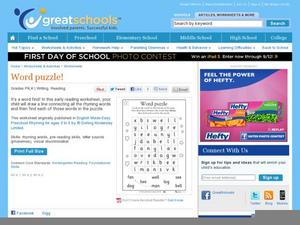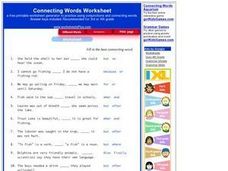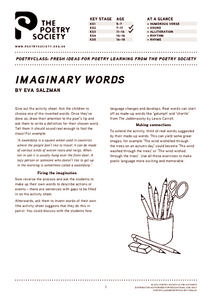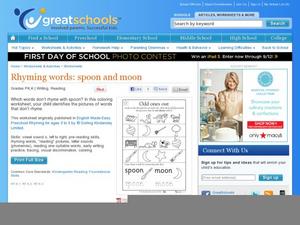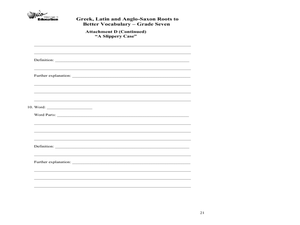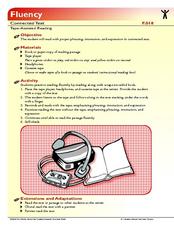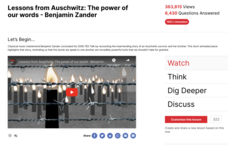1 plus 1 plus 1 equals 1
I Can Read! Sight Words Set #1
Focus on the fundamentals of reading with a series of sight word activities. Kids work with the words a, and, see, and the by connecting the dots, playing bingo, and finding the words in a mixed-up list.
1 plus 1 plus 1 equals 1
I Can Read! Sight Words Set #3
Practice sight words with an array of fun activities. Kids focus on like, is, my, and it with bingo games, connecting the dots, and tracing activities.
Lynette
Prefix, Suffix, and Root Word Worksheets
Words are kind of like a train, with affixes as the added cars. Practice prefixes, suffixes, and root words with these worksheets. Learners add words on to the beginning and end of words, practice with some roots, and use the words in...
Curated OER
Word Puzzle
Add some fun to rhyming using a word puzzle worksheet. First, learners match up single-syllable rhyming words. Then, they find all the words in a word search. This beginning reading activity only has words spelled horizontally from left...
US National Library of Medicine
Drug Use and Abuse: Past and Present
Pick your poison: tobacco, alcohol, opiates, cocaine, or marijuana. An online exhibition launches a research project that asks groups to select one of the five drugs and gather information on how the use of the drug and the regulations...
EngageNY
Incredibly Useful Ratios
Start the exploration of trigonometry off right! Pupils build on their understanding of similarity in this lesson that introduces the three trigonometric ratios. They first learn to identify opposite and adjacent sides before exploring...
Curated OER
Connective Blockbusters
A very clever language arts game awaits your class in this short language arts presentation. Connective words and phrases such as: so, however, unless, until, as well, and even though are on a game board. Pupils must make up a sentence...
Curated OER
Connecting Words Worksheet
In this connecting words worksheet, students read ten sentences. From two choices, students select the connecting word that best completes the sentence.
K20 LEARN
It’s All Greek to Me: Greek and Latin Roots
Ancient Greeks and Romans have contributed far more to modern culture than mythic heroes and stunning architecture. Greek and Latin roots are the foundation of many English words. Middle schoolers engage in an activity that asks them to...
Poetry Society
Imaginary Words
Oh, what fun! Young logophiles and neologists create a dictionary-sounding definition for imaginary words and try to fool their classmates.
Curated OER
Rhyming Words: Spoon and Moon
One of these things is not like the other, one of these things does not belong. It's true! Little learners will say each of the four words in each of four rows, to determine which one does not rhyme with the others. After that, they...
Curated OER
Greek, Latin and Anglo-Saxon Roots to Better Vocabulary
Practice vocabulary skills with this word analysis lesson. Middle schoolers examine the roots of unfamiliar words and use their knowledge of roots to discern meaning through word analysis.
Curated OER
Introduce Vocabulary: Alexander, Who Use to be Rich Last Sunday (Viorst)
Although this vocabulary-in-context activity is focused on Judith Viorst's book Alexander, Who Use to Be Rich Last Sunday, the strategy can be applied to any book budding learners read with you. First, introduce the three new words you...
Curated OER
Word Origins
Understanding a word's etymology can really help with decoding and building vocabulary skills. Readers compare and contrast words of similar origins but with different difficulty levels. They focus on prefixes, suffixes, and affixes....
Curated OER
Mythological Word Origins
Review myths and the characters therein, connecting them to vocabulary words in the English language today. Begin by searching online for myths and character names. With at least ten names that are familiar English words, students use...
Florida Center for Reading Research
Fluency: Connected Text, Recorded Reading
Scholars listens to a story on headphones while he reads along with a visual text using intonation, correct pacing, and fluency.
Read Write Think
Poetry Portfolios: Using Poetry to Teach Reading
Over the course of five periods, scholars create a poetry portfolio. They begin with a reading of the poem, Firefly. With a focus on vocabulary, learners reread the poem then look for sight words and other skills.
Meadows Center for Preventing Educational Risk, University of Texas at Austin
Lesson 16 - Adding Vowel Suffixes to CVC and Silent E Base Words
There's a big difference between hoping and hopping. A lesson on adding vowel suffixes discusses when to double a consonant before adding a suffix such as -ed or -ing. Readers practice breaking down words into syllables and creating new...
Curated OER
Writing and Presenting a Fable Using Research
Elementary and middle schoolers research animal facts and use them in a fable. First, they pair-share to find animal traits to use in writing a fable. They then complete a prewriting worksheet. After going through the writing process,...
TED-Ed
Lessons from Auschwitz: The Power of Our Words
Some words are best left unspoken. Words matter, according to Benjamin Zander, conductor, teacher, and lecturer. To illustrate his point, Zander recounts a story told to him by a survivor of Auschwitz. As a result of her experience this...
EngageNY
Using Multiple Resources of Information: Creating a Cascading Consequences Chart about DDT and Practicing a Fishbowl Discussion
For every action there is a consequence. Scholars continue their work on creating a cascading consequence chart about DDT using Welcome Back, The Exterminator, Rachel Carson: Sounding the Alarm on Pollution along with graphic organizers...
Curated OER
Poetic Word Choice
Groups or pairs choose ordinary objects from a bag and rename them based on traits, so that a stapler becomes a "paper cobra." Then they connect this exercise to the way authors use language to emphasize certain traits through word...
Curated OER
Connecting Ideas
The proper way to connect ideas in a sentence is covered in the comprehensive resource. First, learners discuss how to use and, but, and or to connect ideas. Then, they explore the use of other commonly used words. Finally, they look at...
EngageNY
Getting the Gist and Determining Word Meaning: Paragraphs 12–14 of Steve Jobs’ Commencement Address (and connecting to Chapter 8)
Groups use a Venn diagram to compare the theme of love and loss in Steve Jobs' 2005 commencement address to Stanford University students and Christopher Paul Curtis' Bud, Not Buddy.





